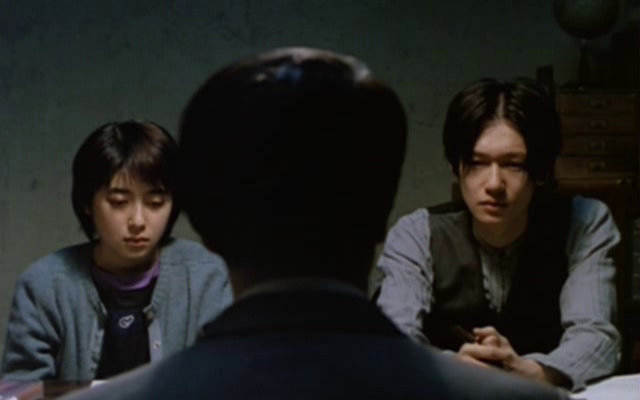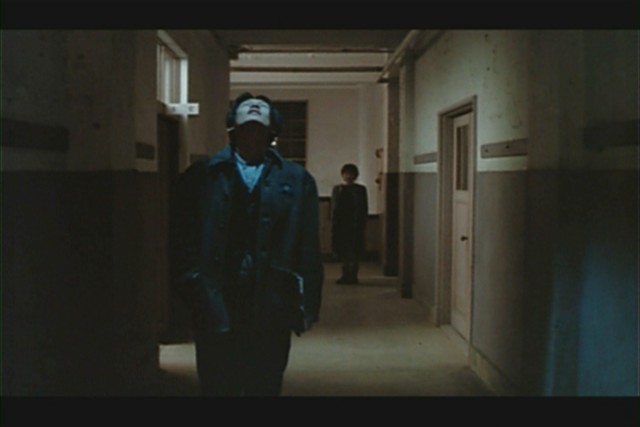AFTER LIFE (WANDÂFURU RAIFU) (Hirokazu Kore-eda, 1998)
Japan Society
333 East 47th St. at First Ave.
Wednesday, February 19, $12, 7:00
212-715-1258
www.japansociety.org
 Japan Society’s five-film, five-month, five-director tribute to writer, critic, scholar, curator, and filmmaker Donald Richie, who died on February 19, 2013, at the age of eighty-eight, comes to a close on the one-year anniversary of his passing in appropriate fashion, with a screening of Hirokazu Kore-eda’s second narrative feature, After Life, Kore-eda’s eminently thoughtful film about two of his recurring themes: death and memory. Every Monday, the deceased arrive at a way station where they have three days to decide on a single memory they can bring with them into heaven. Once chosen, the memory is re-created on film, and the person goes on to the next step of his or her journey, to be replaced by a new batch of souls. The way station is staffed by guides, including Takashi Mochizuki (Arata), Shiori Satonaka (Erika Oda), and Satoru Kawashima (Susumu Terajima), whose job it is to interview the new arrivals and help them select a memory and then bring it to life on-screen. Some want to take with them an idyllic moment from childhood, others a remembrance of a lost love, but a few are either unable to or refuse to come up with one, which challenges the staff. Twenty-one-year-old Yūsuke Iseya declares, “I have no intention of choosing. None,” while seventy-year-old Ichiro Watanabe (Taketoshi Naito) is having difficulty deciding on the exact moment, reevaluating and reflecting on the life he led. (Ichiro’s wife is played by Kyōko Kagawa, who has also appeared in films by Yasujiro Ozu, Akira Kurosawa, and Kenji Mizoguchi, three seminal directors whose work was previously shown in the Japan Society series.) As the week continues, the guides look back on their lives as well, sharing intimate details, one of which leads to an emotional finale.
Japan Society’s five-film, five-month, five-director tribute to writer, critic, scholar, curator, and filmmaker Donald Richie, who died on February 19, 2013, at the age of eighty-eight, comes to a close on the one-year anniversary of his passing in appropriate fashion, with a screening of Hirokazu Kore-eda’s second narrative feature, After Life, Kore-eda’s eminently thoughtful film about two of his recurring themes: death and memory. Every Monday, the deceased arrive at a way station where they have three days to decide on a single memory they can bring with them into heaven. Once chosen, the memory is re-created on film, and the person goes on to the next step of his or her journey, to be replaced by a new batch of souls. The way station is staffed by guides, including Takashi Mochizuki (Arata), Shiori Satonaka (Erika Oda), and Satoru Kawashima (Susumu Terajima), whose job it is to interview the new arrivals and help them select a memory and then bring it to life on-screen. Some want to take with them an idyllic moment from childhood, others a remembrance of a lost love, but a few are either unable to or refuse to come up with one, which challenges the staff. Twenty-one-year-old Yūsuke Iseya declares, “I have no intention of choosing. None,” while seventy-year-old Ichiro Watanabe (Taketoshi Naito) is having difficulty deciding on the exact moment, reevaluating and reflecting on the life he led. (Ichiro’s wife is played by Kyōko Kagawa, who has also appeared in films by Yasujiro Ozu, Akira Kurosawa, and Kenji Mizoguchi, three seminal directors whose work was previously shown in the Japan Society series.) As the week continues, the guides look back on their lives as well, sharing intimate details, one of which leads to an emotional finale.
Kore-eda, who previously examined memory loss in the documentary Without Memory and explored a family’s reaction to death in the brilliant Still Walking, interviewed some five hundred people about what memory they would take with them to heaven, and some of those nonprofessional actors are in the final cut of After Life, blurring the lines between fiction and reality. After Life is also very much about the art of filmmaking itself, as each memory is turned into a short movie created on a set and watched in a screening room. In fact, the film was inspired by Kore-eda’s memories of his grandfather’s battle with what would later be identified as Alzheimer’s disease; the director has also cited Ernst Lubitsch’s 1943 comedy, Heaven Can Wait, as an influence, and the Japanese title, Wandâfuru raifu, means “Wonderful Life,” evoking Frank Capra’s holiday classic. But Kore-eda never gets maudlin about life or death in the film, instead painting a memorable portrait of human existence and those simple moments that make it all worthwhile — and will have viewers contemplating which memory they would take with them. After Life is screening at Japan Society on February 19 at 7:00, concluding “Richie’s Fantastic Five: Kurosawa, Mizoguchi, Ozu, Yanagimachi & Kore-eda,” and will be introduced by Yale professor Aaron Gerow. (In addition, Kore-eda’s latest film, the masterful Like Father, Like Son, has been extended at the IFC Center.)

